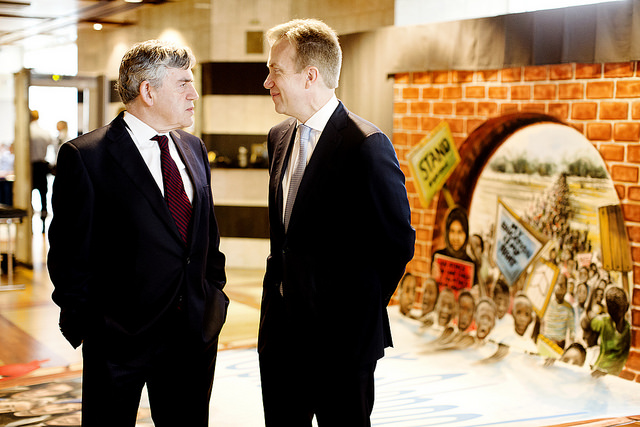New Commission to Transform Education Financing — Oslo Summit

Photo Courtesy of Norway MFA/Espen Røst.
No education, no development. This was the message that rang throughout the second day of the Oslo Summit for Education and Development as government leaders gathered to tie up the loose ends of international education policy prior to September’s adoption of the new Sustainable Development Goals (SDGs).
“I welcome this Summit’s focus on girls, on emergencies, on the quality of education, and on investments,” said UN Secretary-General Ban Ki-moon during the opening of the second and final day of the high-level meeting. “More than six million people asked for action on these issues when they signed the Up For School petition that I endorsed.” The petition, organized by the international nonprofit, A World at School, recently surpassed 8 million signatures after Angry Birds released a special #UpForSchool tournament and Justin Bieber called on his fans to support the campaign.
In his closing remarks, Norwegian Foreign Minister Børge Brende called on world leaders to renew their commitment to the ideals and goals of Incheon’s World Education Forum. Throughout the two-day summit, the 400-plus assembly of government heads, civil society members, and private sector representatives agreed to reverse the negative trend in international support for education, primarily via the vehicle of public-private partnerships and national-international funds which would drive new financing mechanisms.
“It is unbelievable that in the the 21st century 59 million children still do not have access to school,” said Brende as he led the press conference that followed the day’s recap. “This summit should be for the forgotten children,” he said echoing UN Secretary-General Ban Ki-moon’s reminder from earlier that day.
Supporting education’s most fragile forms — namely education in emergencies and education for the most marginalized — would embody one of the major objectives of the post-2015 development agenda for education.
Right now, 20 million of the 59 million children currently out of school are living in conflict situations like those occurring in Syria or South Sudan. Ten million girls a year are forced into early marriages and 168 million children — some as young as 5 — are laboring rather than learning in the classroom. Despite this, education aid has been cut by 22 percent over the past two years while general aid has been rising. One hundred times more money is being spent on the education of a child in the West than in the poorest countries in the world.
“When we look at that UNESCO report, under present trends — and this is what the crisis is about — it will not be until 2086 that every child will be in primary school,” said UN Special Envoy for Education Gordon Brown during his final speech on the second day of the Oslo Summit. “Even if every government spent 5 percent of their national income on education, raised the growth rate of their economy every year, was able to tax its citizens to the level that was necessary to pay for all these services, there would still be a $25 billion funding gap to provide for universal goal of secondary and primary education for all.”
This funding gap, world leaders present at the summit agreed, could be at least partially addressed through private sector partnerships with governments and nongovernmental organizations. The education in emergencies funding or financing mechanism could do more than just supplement aid, Brown argued.
In fact, a Global Commission on Financing Education, which was formally announced in the press conference wrapping up the summit’s final day, could prove that investing in global education could provide economic returns and strengthen other sectors. Not unlike the Global Commission on the Economy and Climate, the Education Commission would work to back the goal of free, universal education across the globe with concrete evidence tied to economic gains and wider social outcomes. The commission’s initial deadline is set so that the first findings will be revealed at the United Nations General Assembly in the fall of 2016.
The summit participants agreed that leveraging learning through ICT, digital technology, and better infrastructure would also be crucial to delivering education to those who need it most.
“Education is a prerequisite for eradicating all extreme poverty,” said Brende.
